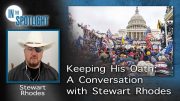
Forget about voting by mail, it is so yesterday. A Washington, D.C., City Council bill would allow people to cast their votes using their smartphones and tablets.
Brooke Pinto, a Democrat, introduced the bill dubbed “Mobile Voting Options for Turnout Equity Amendment Act of 2022,” or Mobile VOTE Act, Friday along with seven colleagues. She believes the initiative would simplify the voting process and enable individuals in “underserved communities” who would likely otherwise sit out the election to participate.
According to Pinto’s press release,
“Our city and nation have well established values that voting rights are civil rights; enfranchising District residents by making voting easy and accessible for all is fundamentally important in advancing those values,” said Councilmember Pinto. “Despite District efforts to increase voting access, many residents continue to face voting barriers.”
Pinto further lamented that “hundreds of thousands” of eligible District voters don’t vote. While the capital residents showed up at the polls in previously unseen numbers to cast their ballots in the “historic 2020 elections,” they remain unengaged when it comes to the local races, per Pinto. This situation is, not surprisingly, blamed on racism and sexism. According to the councilmember,
Older adults, people with limited English proficiency, and people with disabilities, visual impairment, or limited transit access may have difficulty voting in person. Additionally, caregivers in the District, many of whom are women of color, and individuals who are hospitalized or have other emergencies, may also face barriers to voting.
These categories of voters, Pinto says, have been “historically underserved or excluded from the election process.” Pinto did not specify what are the modern “barriers” that are preventing older people or people of color from casting their ballots in the nation’s capital.
Nonetheless, she insists that “Mobile voting is one essential way to reduce barriers to voting and move the District to the forefront of modernizing elections.”
If passed, the bill would allow any eligible voter to cast an absentee ballot from a smartphone, tablet, or a computer “without having to travel to a polling site or mailbox or to stand in line to vote.” Pinto likened the process to submitting tax forms electronically. After voters submit their votes via the mobile devices, the elections board would print and count the ballots.
Likely foreseeing concerns over the proposed system’s security and privacy, Pinto claimed that it would “build on rapid advancements in cryptography in recent years that would allow voters to verify the system works correctly from end to end by verifying their own ballot, and allow the Board of Elections to protect privacy, anonymity, and integrity of digital ballots.”
The bill would also establish an auditing system to report security threats and require the District’s Board of Elections (BOA) to create a system that protects voter data. It would also require personally identifiable information to be kept confidential and permanently deleted after a vote is cast.
The Washington Post reported how the initiative was supported by the representatives of various D.C. communities. Those included the senior pastor at Mount Lebanon Baptist Church, who said that mobile voting would “make voting more accessible for all D.C. residents.”
Tajuan Farmer, legislative chair for the National Federation of the Blind of D.C. Residents said he liked the initiative because he would not have to worry that “a voting location will be accessible or if the screen-reading features on the voting machines will work.”
The National Association for the Advancement of Colored People (NAACP) claimed that people of color often encounter difficulty finding time to vote because of their busy work schedule, and praised Pinto’s initiative.
The bill will most likely face opposition over the system’s high susceptibility to hacking, according to DCist. Per the outlet,
“There is currently no internet technology available that allows for the secure transmission of voted ballots while also maintaining voter privacy and ballot verifiability,” wrote Mark Lindeman, an expert on voting security and audits with Verified Voting, a nonpartisan group that focuses on elections and technology, in a recent letter to legislators in Rhode Island considering a bill to allow ballots to be returned over the internet.
Four federal agencies concluded in a May 2020 assessment,
Securing the return of voted ballots via the internet while ensuring ballot integrity and maintaining voter privacy is difficult, if not impossible, at this time.
D.C. has already tried and failed to enhance its voting system with modern-day technology. For example, in August 2020, the elections board suspended use of its “notoriously buggy” and “unreliable” app that allowed voters to register to vote or change their registration.
The outlet points out that Pinto’s initiative follows a push launched last year by venture capitalist and former political operative Bradley Tusk “to make D.C. the first place in the country to formally adopt mobile voting.” Tusk is said to be passionate about mobile voting, and heavily invested in at least 20 mobile voting projects. Among other initiatives, Tusk funded mobile-voting pilot programs across seven states — including Washington, West Virginia, and Oregon — mostly to support overseas and military voters, per DCist. “But his effort in D.C. would represent the first push to make mobile voting a permanent part of elections for all voters,” stressed the outlet.
The D.C. Council is already at work on a number of voting reforms, including one that would enshrine sending all district voters ballots by mail, and another that would introduce ranked-choice voting.





